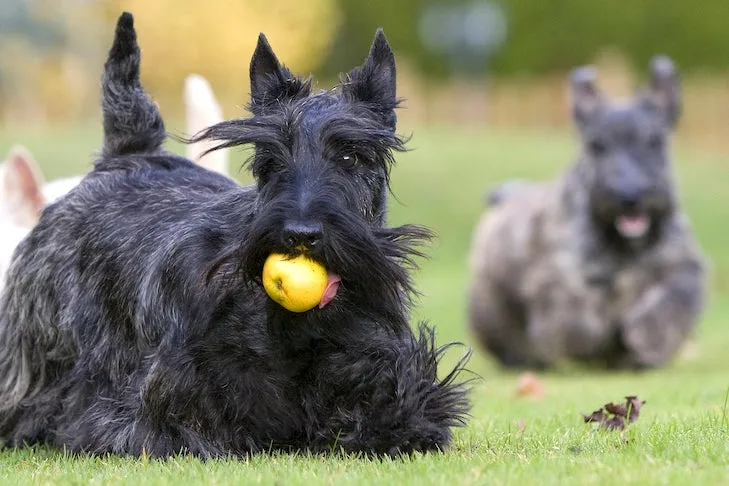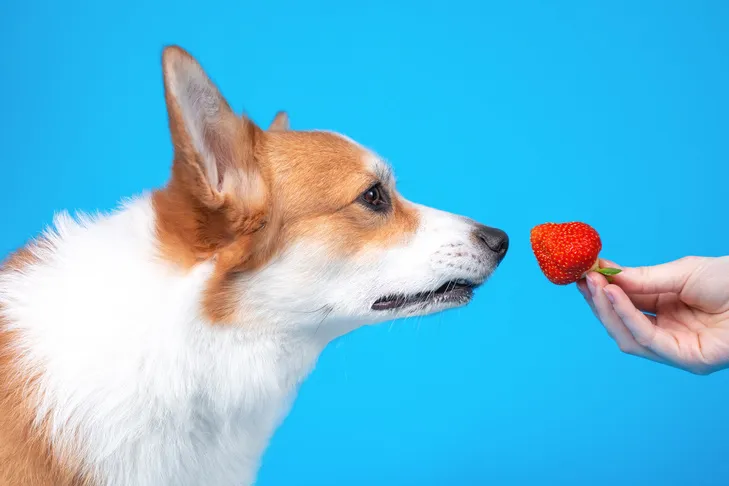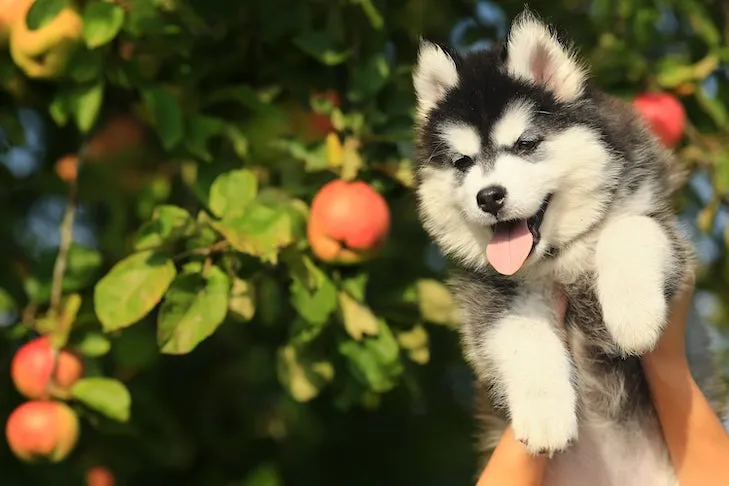It’s natural to want to share a bite of your favorite fruit with your furry friend, especially when they give you those irresistible puppy-dog eyes. However, the digestive systems of dogs and humans are quite different, and what’s a healthy treat for us can be toxic or dangerous for our canine companions. Understanding which fruits are strictly off-limits and which can be given in moderation is crucial for your dog’s health and safety. This guide from Dog Care Story will help you navigate the world of fruits and your dog’s diet, focusing on the essential question: what fruits are dogs not allowed to eat?
The Importance of Knowing Which Fruits Dogs Should Avoid
While some fruits can offer valuable vitamins, minerals, and antioxidants to dogs in small quantities, others contain compounds, seeds, or parts that are downright toxic. Ingesting these harmful fruits can lead to a range of health issues, from mild gastrointestinal upset to severe organ damage and even death. As responsible pet parents, it’s our duty to be informed and keep these dangerous items out of our dogs’ reach. Dogs, as omnivores, don’t strictly require fruits as part of their main diet, but dog-safe fruits can be a welcome occasional treat.
Fruits Dogs Should Never Eat
When considering your dog’s diet, some fruits should be entirely avoided due to their toxic properties or potential for serious harm. Here are the fruits that should never make their way into your dog’s bowl.
Avocado
While often hailed as a superfood for humans, avocado is a definite no-go for dogs. The pit, skin, and leaves of avocados contain a fungicidal toxin called persin. While the fleshy inside of the avocado fruit has less persin, it can still be enough to cause adverse reactions in some dogs, especially in larger quantities. Persin can lead to vomiting and diarrhea in canines.
Beyond the toxin, avocado flesh is notably high in fat. Consuming too much fat can cause gastrointestinal upset, and in more severe cases, contribute to serious health conditions like pancreatitis, an inflammation of the pancreas that can be extremely painful and life-threatening for dogs. To ensure your dog’s well-being, it’s best to keep all parts of the avocado far away from them. If you’re looking for coat health benefits often associated with avocado, consider vet-approved dog treats or supplements that incorporate safe, processed avocado oils.
Cherries
With the exception of the ripe, fleshy fruit around the seed, most parts of the cherry plant, including the stems, leaves, and particularly the pits, contain cyanide. Cyanide is a potent toxin that disrupts cellular oxygen transport, meaning your dog’s blood cells can’t get enough oxygen, which can be fatal.
If you have a cherry tree, ensure your dog does not have access to fallen fruit, as pits can easily be ingested. Ingesting whole cherries or cherry pits can lead to cyanide poisoning. Symptoms to watch for include dilated pupils, difficulty breathing, and red gums, which constitute a veterinary emergency. Always dispose of cherry pits in a dog-proof trash can or bin that your dog cannot access. It’s also vital to educate children about the dangers of sharing cherries or their pits with pets. For the antioxidant benefits found in cherries, look for specifically formulated cherry-flavored dog treats.
Grapes and Raisins
Perhaps one of the most well-known toxic foods for dogs, grapes and their dried form, raisins, are highly dangerous. Even small amounts can lead to acute sudden kidney failure in dogs, regardless of their breed, sex, or age. The exact toxic compound in grapes is still unknown, but their effects are severe and can be life-threatening.
If you suspect your dog has eaten any amount of grapes or raisins, contact your veterinarian immediately. Do not wait for symptoms to appear, as early intervention can be critical. Be extremely vigilant about this dangerous fruit, especially if grapes or raisins are commonly consumed in your household. Never put them in a compost heap accessible to your dog, and ensure all trash receptacles are secure. This is one of the most critical fruits dogs should not eat.
 Scottish Terriers playing in the grass.
Scottish Terriers playing in the grass.
Tomatoes (Green Parts)
While the ripened red flesh of a tomato fruit is generally considered safe for dogs in very small, infrequent amounts, the green parts of the tomato plant – including the leaves, stems, and unripe green tomatoes – contain a toxic substance called solanine. Ingesting solanine can cause gastrointestinal upset, cardiac issues, and muscle weakness.
A dog would typically need to eat a significant quantity of the green plant material to become severely ill. However, to eliminate any risk, it’s generally best to avoid feeding tomatoes to your dog altogether. If you have a vegetable garden, take precautions to prevent your dog from exploring or chewing on your tomato plants.
Fruits Dogs Can Eat (In Moderation)
While the primary focus is on What Fruits Are Not Allowed For Dogs, it’s also helpful to know which fruits can be safely shared as occasional treats. Remember, moderation is key due to their sugar content, and always remove pits, seeds, and tough rinds.
Apples
A great source of vitamins A and C, and fiber. Low in protein and fat, making them ideal for senior dogs. Always remove seeds and core as apple seeds contain small amounts of cyanide. Frozen apple slices make a refreshing snack.
Bananas
High in potassium, vitamins, biotin, fiber, and copper. Low in cholesterol and sodium. Due to high sugar content, offer only as an occasional treat.
Blueberries
A superfood rich in antioxidants, fiber, and phytochemicals. Great for training treats.
Cantaloupe
Packed with nutrients, low in calories, and a good source of water and fiber. High in sugar, so limit intake, especially for overweight or diabetic dogs. Freeze cubes for a summer treat.
Cranberries
Both fresh and dried cranberries are safe in small quantities. Choose unsweetened varieties as many commercial dried cranberries are high in added sugar. Too many can cause an upset stomach.
Cucumbers
Excellent for overweight dogs as they are low in carbs and fat, and high in hydration. Rich in vitamins K, C, B1, potassium, copper, magnesium, and biotin. Freeze slices for a cool treat.
 Dog cucumber
Dog cucumber
Mango
Loaded with vitamins A, B6, C, and E, plus potassium, beta-carotene, and alpha-carotene. Always remove the hard pit first, as it contains small amounts of cyanide and is a choking hazard. High in sugar, so feed sparingly.
Oranges
Fine for dogs in small amounts, but many dogs dislike the strong citrus smell and taste. A good source of vitamin C, potassium, and fiber. Only offer the juicy flesh, free of seeds and peel, which can upset their digestive system.
Peaches
Fresh or frozen peach slices are a good source of fiber and vitamin A. Like cherries, peach pits contain cyanide and must be completely removed and safely discarded. Avoid canned peaches due to high sugar syrup content.
Pears
High in copper, vitamins C and K, and fiber. Cut into bite-size chunks and remove pits and seeds, which contain traces of cyanide. Steer clear of canned pears with added sugars.
Pineapple
A great sweet treat in small chunks, provided the prickly peel and crown are removed. Rich in vitamins, minerals, fiber, and bromelain (an enzyme aiding protein absorption). Avoid sweetened canned pineapple.
Pumpkin
Pure pumpkin puree (not pie filling) is excellent for digestive health, helping with both diarrhea and constipation. Rich in antioxidants. Always choose 100% pumpkin puree or roast fresh pumpkin yourself.
Raspberries
Safe in moderation, providing antioxidants, fiber, manganese, and vitamin C. Low in sugar and calories. Good for senior dogs due to anti-inflammatory properties. Limit to small amounts (e.g., no more than 8 ounces) due to trace amounts of naturally occurring xylitol.
Strawberries
Full of fiber and vitamin C, and contain an enzyme that can help whiten teeth. Offer in moderation due to natural sugar content. Frozen strawberries are a fun enrichment treat.
 Pembroke Welsh corgi and strawberry
Pembroke Welsh corgi and strawberry
Watermelon
Safe for dogs as long as the rind and seeds are removed, which can cause intestinal blockage. The flesh is hydrating and rich in vitamins A, B-6, C, and potassium. Freeze chunks for a refreshing summer treat.
What About Vegetables?
Similar to fruits, certain vegetables are beneficial for dogs, while others pose risks. While this article focuses on “what fruits are not allowed for dogs,” a brief mention of vegetables is appropriate.
Vegetables Dogs Can Eat
Many vegetables can be a healthy, low-calorie addition to your dog’s diet. These include broccoli (in small, cooked amounts), Brussels sprouts (in moderation to avoid gas), carrots (excellent for teeth and vitamins), celery (good for heart health and breath), green beans (plain, all forms), and peas (fresh or frozen, avoid canned with sodium). These can make great what can we give dogs to eat options.
Vegetables Dogs Should Avoid
Some vegetables should be kept away from your dog. Asparagus, while not toxic, offers little nutritional benefit once cooked to an edible texture for dogs. Wild mushrooms are highly toxic, though store-bought, washed mushrooms are generally safe. Most importantly, onions, leeks, and chives (part of the Allium family) are highly poisonous to dogs, causing red blood cell rupture and severe gastrointestinal distress. Always keep these away from your dog. For more detailed information, consider reading our comprehensive guide on what vegetables are not good for dogs.
 Siberian Husky puppy being held up in front of an apple tree.
Siberian Husky puppy being held up in front of an apple tree.
General Guidelines for Feeding Fruits to Dogs
To ensure your dog’s safety and well-being when considering fruit treats, keep these essential guidelines in mind:
- Moderation is Key: Even safe fruits contain natural sugars. Excessive consumption can lead to weight gain, dental problems, or digestive upset. Treats should never make up more than 10% of your dog’s daily caloric intake.
- Remove Pits, Seeds, and Rinds: Always meticulously remove pits (cherries, peaches, mangoes), seeds (apples, pears, watermelon), and tough rinds (watermelon, pineapple, oranges) before offering fruit. These parts can be choking hazards, cause intestinal blockages, or contain toxic compounds.
- Wash Thoroughly: Always wash fruits to remove pesticides, dirt, and bacteria.
- Cut into Appropriate Sizes: Cut fruits into small, bite-sized pieces suitable for your dog’s size to prevent choking, especially for smaller breeds like a Shih Tzu. Small dogs might have different sensitivities; read more about what fruits can shih tzus not eat.
- Introduce Slowly: When introducing a new fruit, start with a very small amount and observe your dog for any signs of digestive upset or allergic reaction.
- Avoid Canned or Processed Fruits: These often contain added sugars, artificial sweeteners (like xylitol, which is highly toxic to dogs), or preservatives that are harmful to dogs. Stick to fresh or plain frozen options.
- Observe for Allergies: Just like humans, dogs can develop allergies to certain foods. Watch for symptoms such as itching, rashes, vomiting, or diarrhea after introducing new foods.
 Rottweiler laying down in the yard, its head tilted.
Rottweiler laying down in the yard, its head tilted.
When to Consult Your Vet
Despite our best efforts, accidents can happen. If you suspect your dog has ingested a toxic fruit or any part of it, such as grape, raisin, cherry pit, or avocado, act quickly:
- Contact Your Veterinarian Immediately: Don’t wait for symptoms to appear. The sooner your vet is aware, the better the prognosis. Provide them with as much information as possible: what your dog ate, how much, and when.
- Emergency Veterinary Care: If your regular vet is unavailable, contact an emergency veterinary clinic.
- Monitor Symptoms: Even if you’ve contacted your vet, keep a close eye on your dog for any changes in behavior, appetite, or physical symptoms like vomiting, diarrhea, lethargy, or difficulty breathing.
Being proactive and informed is the best way to keep your dog safe from harmful foods.
Conclusion
Sharing snacks with our dogs is a joyful part of pet ownership, but it comes with the crucial responsibility of knowing what fruits are not allowed for dogs and which are safe. While many fruits offer wholesome goodness, the dangers posed by grapes, raisins, cherries, avocado, and the green parts of tomato plants cannot be overstated. Always prioritize your dog’s health by sticking to veterinarian-approved treats and thoroughly researching any human food you consider sharing. When in doubt, it’s always best to err on the side of caution and consult your veterinarian. Stay informed, stay vigilant, and enjoy countless healthy moments with your beloved canine companion.
